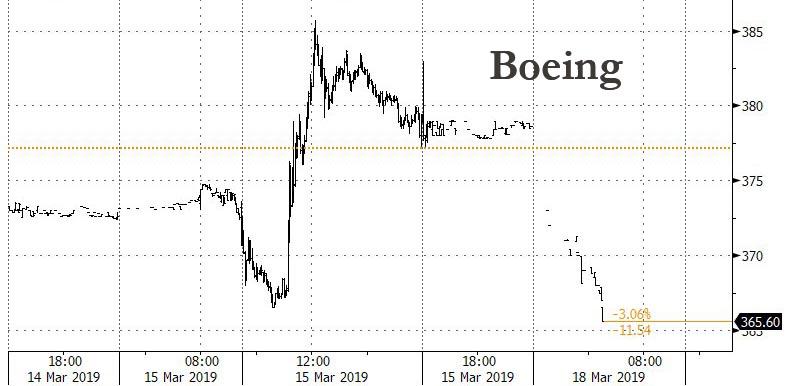In the latest blow to both Boeing and the Federal Aviation Administration, the WSJ reported overnight that Federal prosecutors and Department of Transportation officials are scrutinizing the development of Boeing 737 MAX jetliners and in particular its anti-stall (MCAS) system, inquiries described as “unusual” and which come amid probes of regulators’ safety approvals of the new plane.
The Seattle Times separately reported that Boeing’s safety analysis of a new flight control system on 737 MAX jets had several crucial flaws.
According to the WSJ, a “grand jury in Washington, D.C., issued a broad subpoena dated March 11 – a day after the Ethiopian Airlines crash a week ago – to at least one person involved in the 737 MAX’s development, seeking related documents, including correspondence, emails and other messages.” The subpoena, with a prosecutor from the Justice Department’s criminal division listed as a contact, sought documents to be handed over later this month.
It wasn’t immediately clear if the Justice Department’s probe is related to scrutiny of the FAA by the DOT inspector general’s office, reported earlier Sunday by The Wall Street Journal and that focuses on a safety system that has been implicated in the Oct. 29 Lion Air crash that killed 189 people, according to a government official briefed on its status. Aviation authorities are looking into whether the anti-stall system may have played a role in last week’s Ethiopian Airlines crash, which killed all 157 people on board. The WSJ sources add that the inspector general’s inquiry focuses on ensuring relevant documents and computer files are retained.
The Justice Department probe involves a prosecutor in the fraud section of the department’s criminal division, a unit that has brought cases against well-known manufacturers over safety issues, including Takata Corp.
The news comes at a sensitive time for both the FAA, which was among the last regulators to ground the 737 Max following a broad global response (led by China) and for Boeing, whose stock has tumbled in the aftermath of the latest crash, and as the WSJ notes, “it is highly unusual for federal prosecutors to investigate details of regulatory approval of commercial aircraft designs, or to use a criminal probe to delve into dealings between the FAA and the largest aircraft manufacturer the agency oversees.”
Probes of airliner programs or alleged lapses in federal safety oversight typically are handled as civil cases, often by the DOT inspector general. The inspector general, however, does have authority to make criminal referrals to federal prosecutors and has its own special agents.
Ironically, over the years, U.S. aviation companies and airline officials have been sharply critical of foreign governments, including France, South Korea and others, for conducting criminal probes of some plane makers, their executives and in some cases, even individual pilots, after high-profile or fatal crashes. The FAA’s current enforcement policy stresses enhanced cooperation with domestic airlines and manufacturers—featuring voluntary sharing of important safety data—instead of seeking fines or imposing other punishment.
News of the U.S. government scrutiny comes shortly after Ethiopia’s transport minister, Dagmawit Moges, said there were “clear similarities” between the two crashes. U.S. officials cautioned that it was too early to draw conclusions because data from the black boxes of the Ethiopian Airlines plane still need to be analyzed. The two crashes – which may be linked to the same structural defect on the airliner – have sparked the biggest crisis Boeing has faced in about two decades, threatening sales of a plane model that has been the aircraft giant’s most stable revenue source and potentially making it more time consuming and difficult to get future aircraft designs certified as safe to fly.
The FAA said Sunday that the 737 MAX, which entered service in 2017, was approved to carry passengers as part of the agency’s “standard certification process,” including design analyses; ground and flight tests; maintenance requirements; and cooperation with other civil aviation authorities. Agency officials in the past have declined to comment on various decisions regarding specific systems. Sunday’s statement said the agency’s “certification processes are well established and have consistently produced safe aircraft.”
Earlier, a Boeing spokesman said: “The 737 MAX was certified in accordance with the identical FAA requirements and processes that have governed certification of all previous new airplanes and derivatives. The FAA considered the final configuration and operating parameters of MCAS during MAX certification, and concluded that it met all certification and regulatory requirements.”
Boeing Chief Executive Dennis Muilenburg said in a statement Sunday the company continues to support the Ethiopian investigation, “and is working with the authorities to evaluate new information as it becomes available.” Muilenburg added: “As part of our standard practice following any accident, we examine our aircraft design and operation, and when appropriate, institute product updates to further improve safety.”
Governments world-wide have grounded the MAX, an updated version of the decades-old 737, while investigators and engineers seek clues.
And so, as 737 Max scrutiny grows and as Boeing and the FAA now seek to deflect increased government attention to one another – Boeing stock is once again tumbling, and is down 3% in premarket trading…
… erasing most of Friday’s gains which followed a report from Boeing that a software “fix” is being rolled out, which in light of the latest news, may no longer be useful especially if the government finds that “shot cuts” were taken in the development of the plane.
via ZeroHedge News https://ift.tt/2TboUw5 Tyler Durden
